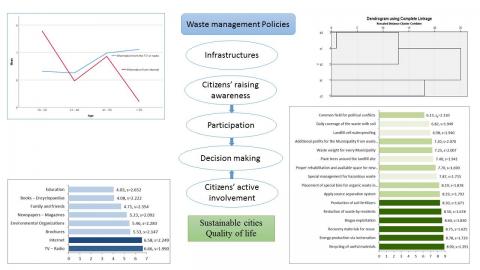You are here
Waste management in urban environments: Insights of the citizens’ views in a densely populated municipality in Greece

Urbanization, industrialization and economic growth have considerable challenged the orientation of waste management policies and practices. Intrinsically, major concerns appear in urban environments, as they receive increased volumes of waste, which in turn pose threats for the environment and public health. Prioritization of waste prevention is proven to be the optimal solution in preserving resources and coincide with international sublime strategies for sustainable waste management. However, the citizens’ awareness and active involvement, in decision making for sustainable waste management policies practices, are preconditions for their implementation. The study examined the citizens’ views on the local waste management policies and strategies in the urban environment of Neapolis-Sykies Greece. The application of factor analysis, hierarchical log-linear analysis and hierarchical cluster analysis provided important correlations regarding the citizens’ demographic characteristics, littering behavior, sources of information on waste management issues, perceptions about quality of life and provided cleanliness services. In particular, collection points and collection system are positively assessed, while the value of recycling is widely acknowledged. Albeit, the citizens are not properly informed about local policies and practices related to existing waste management issues in their municipality. Unfortunately, this is deemed to be a barrier in promoting public participation in decision making processes.
